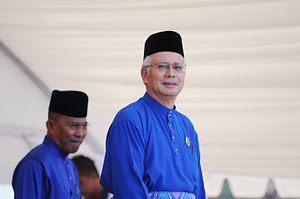It’s that time again—time for resolutions that last a couple weeks into the new year and bold predictions that (surely) will turn out right this year. Right?
1. Najib tun Razak Will Be Malaysia’s Prime Minister at the End of 2016
For most of 2015, many Malaysian politicians, observers, and activists wrote Najib off, sure that the in-fighting within the governing coalition, the scandals around the 1MDB state fund, and the torrent of criticism of Najib by former prime minister Mahathir would ultimately force Najib out of office. They were wrong. In fact, after surviving UMNO’s December general meeting unscathed, Najib passed legislation that will entrench his power. Just before the end of parliament’s sessions for the year, Najib presided over the passage of new legislation that will potentially give the government unprecedented powers to detain critics on national security-related charges. Expect Najib to still be in control in Malaysia as this year ends as well.
2. Thailand’s Elections Will Be Pushed Back Again
The Thai junta, which took power in a coup in May 2014, has pushed back the date for elections and a handover of power several times, after a draft new charter collapsed. Prime Minister and junta chief Prayuth Chan-ocha has now promised elections in 2017, but Prayuth also shows signs that he is consolidating his rule. This past year, the military has been busy purging members of its ranks not aligned with Prayuth’s army faction, and launching an even more intensive crackdown on dissent than it did in the months after May 2014. With the Thai king still alive but apparently quite ill, expect Prayuth and the other generals to push elections off even farther, possibly into 2018 or beyond.
3. Jokowi Will Have a Better Year
2015 was a difficult year for Indonesian President Joko Widodo. Struggling to make the transition in his first full year on the job from city mayor to leader of one of the most powerful nations in the world, at times he seemed to zigzag on foreign and economic policies from day to day. His personalized style of decision-making, in which he relied on few close advisors and often made decisions by his gut, proved unworkable in governing such a large and diverse country. Saddled with ministers and other officials who had proven themselves at PDI-P loyalists but did not embody Jokowi’s brand of clean politics, the president also found his reputation as a different type of politician tarnished. It got worse. In the fall, haze enveloped parts of Indonesia and spread throughout the region; Jokowi went home after one day of a planned multi-day trip to the United States to help lead the fight against the haze. By leaving so soon, he may have alienated some of the major corporate leaders he had planned to meet and woo later in the trip on the U.S. West Coast.
Given his troubled 2015, 2016 could hardly go worse for Jokowi. And, in all likelihood, the Indonesian president will have a better year. He already has shed himself of several ministers and advisors who had damaged his reputation for fighting graft, and his public image also has benefited from the recent scandal surrounding the speaker of the lower house of parliament, who allegedly tried to extort money from Freeport McMoran. The fact that Jokowi’s energy minister actually reported the allegations against the speaker to the parliamentary ethics committee is, to many Indonesians, a sign that Jokowi’s administration is taking graft seriously. In addition, Jokowi has slowly and steadily begun to push back against economic nationalists within his administration and in parliament. Although the president is unlikely to deliver the massive regulatory reforms he promised in late 2015, the president has set an ambitious economic reform agenda. If he can even push through half of the reforms he has promised for 2016, both local and foreign investors will cheer, and the Indonesian economy will benefit.
4. Laos Will Not Be an Effective Asean Chair
In 2015, the Association of Southeast Asian nations was chaired by Malaysia, a country with a wealth of skilled and English-speaking diplomats and officials, and the capacity to capably hold hundreds of meetings annually. Although the Malaysian government was distracted by the 1MDB scandal and in-fighting within UMNO, it still managed an effective chairmanship. Laos will have serious trouble doing the same. Of all the members of Asean, Laos is by far the least prepared to chair the organization; its diplomatic and bureaucratic corps is small, and it has no leaders who could take charge at an Asean meeting and help bridge gaps on divisive issues. Laos is the most authoritarian nation in Southeast Asia, and Laotian leaders already have shown that they are uncomfortable with the nongovernmental aspects of Southeast Asian integration, declining to let Asean civil society groups hold a meeting next year in Laos.
5. China Will Show Southeast Asia Both the Stick and the Carrot
As I noted in CFR.org’s roundup on Chinese policy in 2016, Beijing this year probably will continue its dual approach to Southeast Asia. Expect China to continue upgrading atolls in the South China Sea and preparing them for use as military bases, while also using ever-tougher tactics to threaten Vietnamese and Philippine ships traveling in disputed waters—tactics like openly displaying guns pointed at Vietnamese and Philippine vessels. But in dealing with mainland Southeast Asian nations like Thailand, Myanmar, and Laos, which chairs Asean in 2016, China will turn on the charm. In particular, Chinese officials and leaders will be eager to win over the new Myanmar government led by the National League for Democracy.

































